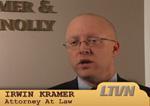Recorded Statements
DAVID PISANIC: Often times, when I am talking to people, I will try to disarm them, by saying I am just an insurance adjustor.
IRWIN KRAMER: The adjustor may be friendly, but he would like to poke holes in your story.
DAVID PISANIC: I am not a lawyer. I am not a police officer.
IRWIN KRAMER: He may not be a cop, but he still carries a dangerous weapon, the tape recorder.
DAVID PISANIC: I am just an insurance adjustor.
IRWIN KRAMER: And this, this is his ammunition.
DAVID PISANIC: If your are insured by us, then part of the conditions are that contract, or the policy or you are going to cooperate with my investigation and that means you are going to allow me take a statement from you.
IRWIN KRAMER: When he turns the tape recorder on be careful because everything you say may be used as evidence against you.
DAVID PISANIC: You can put your foot in your mouth. You can say things you are really did not intend to say. You can give the insurance company the information you did not intend to give them.
IRWIN KRAMER: And in fact a transcript will be made of everything you have to say. So a recorded statement really locks you into a story. If you are not named insurer you do not have to give him a recorded statement and you might want to think twice before doing so.
DAVID PISANIC: Because a recorded statement can hurt. It can hurt you greatly. And in most cases it will hurt you more than it will help you.
IRWIN KRAMER: And if you add any questions about what you should or should not say to the adjustor can solve with the lawyer.
DAVID PISANIC: And ask him, "Look, I have been asked to give this recorded statement, what should I say and what should I not say." If there is ever a question that is really what you want to do first.



